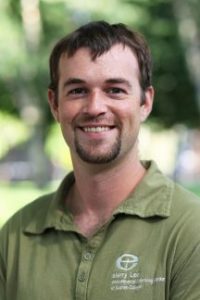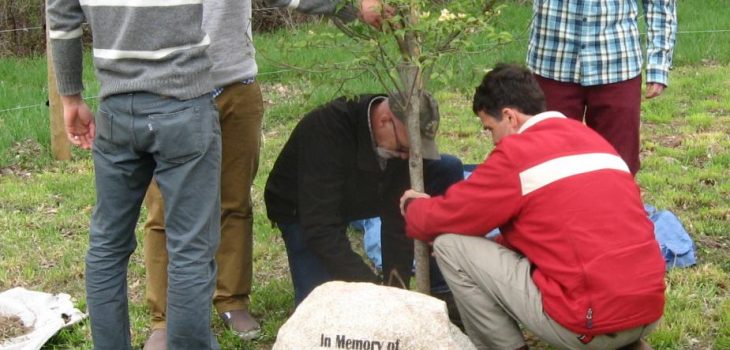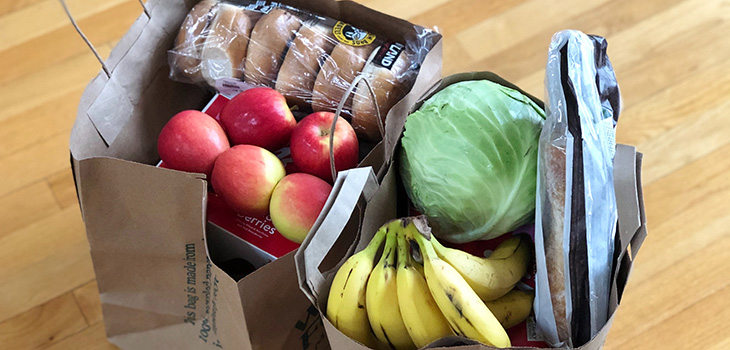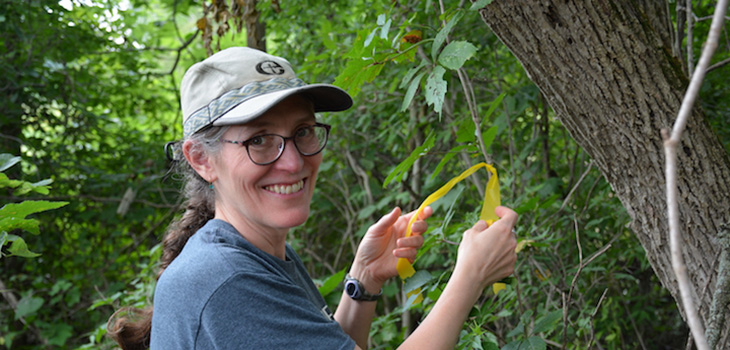 Tom Hartzell first arrived at Merry Lea in 2011 as a master’s student in environmental education, during which he also researched sediment contamination in the Elkhart River. Upon graduating in 2012, he joined the Merry Lea team as coordinator of residential undergraduate programs and an environmental educator.
Tom Hartzell first arrived at Merry Lea in 2011 as a master’s student in environmental education, during which he also researched sediment contamination in the Elkhart River. Upon graduating in 2012, he joined the Merry Lea team as coordinator of residential undergraduate programs and an environmental educator.
For ten years, he provided programmatic and educational support to the Sustainability Leadership Semester (SLS) and Agroecology Summer Intensive (ASI) programs, as well as recruiting and conducting speaking engagements to promote Merry Lea’s collegiate programs. In 2013, Tom began the Sustainability Summit: an annual collegiate conference that brings together regional undergraduate students at Merry Lea to learn and apply skills to their college campuses, network with peers and leaders interested in sustainability, and connect personal faith to the field.
In 2013, he started an after-school program with Central Noble Schools, called PRogram for Outdoor Wilderness Learning (PROWL), connecting K-5th grade students to Merry Lea for several weeks in the fall, winter and spring. PROWL continues today at the campus of Central Noble Schools led by Merry Lea.
We had a conversation with Tom about his time at Merry Lea before we bid a fond farewell to him as he departs for new adventures in Grand Rapids, Mich. We are incredibly grateful for the immeasurable gifts, support and innovative directions he brought to Merry Lea.
What gave you the greatest joy working at Merry Lea?
One of the things I loved most about my job here is the many different things I’ve gotten to do. I’ve gotten to work closely with a lot of the kids from this community, mainly through PROWL. Getting to know them and their families, and helping them to connect with this place has given me a lot of joy.
I’ve also worked a lot with our college students, that’s the main focus of my job. And over the years I’ve shifted more and more to guiding the development of their community: their living and learning community, their cohort. Seeing them build relationships with each other and how that has enabled them to learn more deeply has brought me a lot of joy. They’ve been able to step more deeply and confidently into their studies because they’re in a community that feels supportive where they can be vulnerable.
Also, the canoe trip [as part of the SLS]! Canoeing is probably my favorite thing to do in the world. Being able to craft that experience for the SLS students each fall has been incredibly life-giving, both because I know it’s been transformative for them – and they always have beautiful reflections during and after that trip – and for me personally, feeling more like this is my place, my home. I’ve gotten to know this watershed better and the river’s different every year. Water is always on the move and it changes what it flows through.
What does 11 years of environmental and sustainability education mean to you?
Reflecting on that, I’m left feeling hopeful. I believe strongly in the education that happens here. I believe that our programs are transformative, so thinking about a decade’s-worth of students coming out of PROWL, for example, who know and love this place, makes me hopeful for the future of Noble County. A decade of sustainably-minded college grads coming out of ASI and SLS makes me hopeful for the communities that these students have moved on to and will move on to.
It’s really humbling to think about the ripple effect that my job has made in those students’ lives.
What do you hope the students you’ve taught and worked with have taken away?
I hope they take away that every place and every community matters and has its own unique assets and things to be loved, cared for and stewarded. What are the strengths here? What is going well and how can those be leveraged to make the place even better? I hope they leave with that recognition and with tools they need to identify those pieces and figure out how to make communities stronger and healthier.
What do you hope for the future of Merry Lea?
I hope that transformative, place-based education continues to happen and that our relationships with our neighbors grow stronger and stronger.
I hope that the collegiate programs can flourish and grow, because it’s hard to find another place with programs that make as big of an impact in students’ lives as the ASI, SLS and master’s programs. And I hope that part of that flourishing is figuring out how to make this type of education – and the fields of sustainability and environmental education – more accessible to more people, because the more diverse our learning communities are, the deeper and richer the experience is.
And I hope that Merry Lea keeps trying new things. PROWL was this brand new program that I just dreamt up and took a chance on; and it’s turned out to be really successful and meaningful. I hope that we keep trying to improve and innovate.
What are you most proud of during your time at Merry Lea?
Helping people rethink how they see a place and community, and how they connect with it.
I’m really proud of PROWL and how those kids have developed real relationships with the land here. Before COVID-19, when the students used to come here to Merry Lea, kids would go back to the same place on a trail and remember, ‘Oh this is where we saw that frog or built that fort.’ Or, ‘Wow that fort is still here after a year!’ There are discreet sites here on this property that carry a lot of meaning and memory for those kids. They’re able to recall what they’ve done in that place and are excited to share it with their friends.
What it boils down to is: I’m really proud to be able to create space for people to connect with each other and their place or community in ways that they were not able to before. For example, the canoe trip is this novel experience that most SLS students have never done before and it’s a totally different way of traveling across the landscape. The trip does a lot of reframing for them as they think about a watershed. And the Sustainability Summit created this space where mostly students of faith, and others, who care about sustainability and the environment could come together and discover this community of peers that has been so life-giving for so many of them when they were feeling really isolated, or frustrated or stagnant just at their home campus.
I’m proud of creating those new spaces that foster new connections.
What adventure is next for you?
I am very excited to be joining the team at Calvin University as the campus sustainability program coordinator. I will be working on sustainability efforts around their campus and helping to connect their students, alumni and the community with those efforts. They also have a 104-acre nature preserve that’s part of their campus located on the other side of the road, and part of my job will be to connect the students and surrounding community with that land. And I really love helping to connect people with their place (in case you didn’t know).
What are you grateful for?
Coming to Merry Lea and doing the grad program first was crucial to the success I’ve had here. Those courses, like the natural history course, helped me pay attention to the details of this place and get to know it really intimately and made me want to get to know it better. That’s a big part of what made me excited to share it with the surrounding community. I came in with no teaching experience. I formed that foundation of how to be an effective environmental educator and I’ve used those skills just about every day since: from kindergarteners to college students. The leadership course has principles I use every day too, in the ways I interact with my colleagues and ways I shepherd the community formation at Rieth Village.
I’m really grateful for the specific timeline of my tenure here. Having the grad program as the foundation has been critical to the success of all the different pieces of my job.



